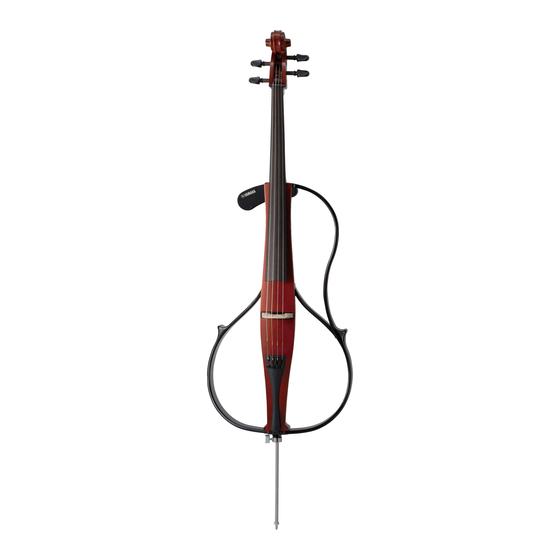Yamaha Silent Cello SVC110 Manuel du propriétaire - Page 7
Parcourez en ligne ou téléchargez le pdf Manuel du propriétaire pour {nom_de_la_catégorie} Yamaha Silent Cello SVC110. Yamaha Silent Cello SVC110 12 pages. Yamaha silent electric cello owner's manual
Également pour Yamaha Silent Cello SVC110 : Manuel d'entretien (29 pages), Manuel du propriétaire (13 pages)

■ Basic Operation
1
Slide the POWER switch, located on the rear of
the instrument, to its ON position. The lamp will
light green.
2
Connect a pair of stereo headphones to the
PHONES jack on the rear of the instrument.
Make sure that the L&R sides of the headphones
are positioned on the correct ears.
3
Rotate the VOLUME dial to the desired playing
level.
■ Reverb Function
The Silent Electric Cello incorporates Yamaha's
DSP reverb technology. Play while trying out the
three types of reverb.
1
Slide the POWER switch to the REV. ON posi-
tion, the lamp will light red, and reverb will be
applied to the Silent Electric Cello's sound.
2
Slide the REVERB switch to select one of the
three reverb modes.
RM (ROOM):
this reverb simulates the natural
reverberation found in a room.
HL1 (HALL 1): this reverb simulates the natural
reverberation found in a hall.
HL2 (HALL 2): the same reverb simulation as HL1
but with a longer decay time.
• When using the headphones, do not play using at high volume levels or for long periods of time.
Doing so can lead to irreparable damage to your hearing.
• If the sound is distorted, rotate the VOLUME dial to the left.
• Before connecting the Silent Electric Cello to any external devices, make sure that the power of
all related devices is turned OFF. Set the volume level of any external audio sources to the mini-
mum level before connecting anything. High volume settings could cause damage to the equip-
ment and your hearing.
• If a connection cord is unplugged while the power is ON, it may result in damage to the equip-
ment. The sudden shock to your ears may be great, so please use with care.
• Be careful not to step on the cord. The cord may break, equipment may be damaged, and this may
cause a substantial shock to your ears.
• The signal from the Silent Electric Cello's output jacks must NEVER be returned to the AUX IN
jack, either directly or through external equipment. Doing so will result in feedback which may
cause damage to the internal electronics.
• When connecting the instrument to external audio equipment, check the jack size and make sure
to use a plug size that corresponds to the jack being used, and properly connect the cable to the
jack.
• When a powered speaker is connect to the LINE OUT jack, speakers with inadequate power
ratings may distort due to the low frequencies produced by the instrument. For sufficient head-
room, used powered speakers with a power rating of 50 watts or more.
■ AUX IN jack
• The AUX IN jack, located on the rear of the in-
strument, can be used to connect an external ste-
reo signal source to the Silent Electric Cello.
Connecting the audio output of a CD player, etc.
to the instrument allows you to play along with
the external audio source.
• The AUX IN jack's signal level can be controlled
with the AUX. VOL control.
■ LINE OUT jack
The LINE OUT jack, located on the rear of the
instrument, delivers the stereo signal of the Si-
lent Electric Cello to external audio equipment.
Using an optional stereo phone plug cable (or
monaural phone plug cable) to connect the in-
strument to the audio input jack of external Pow-
ered speakers, mixing console, etc. to listen from
external audio equipment or recording.
The LINE OUT jack's signal level can be con-
trolled with the VOLUME control.
7
